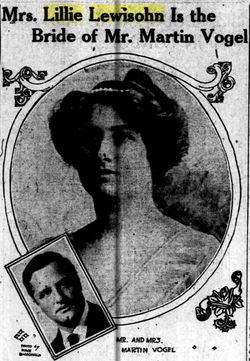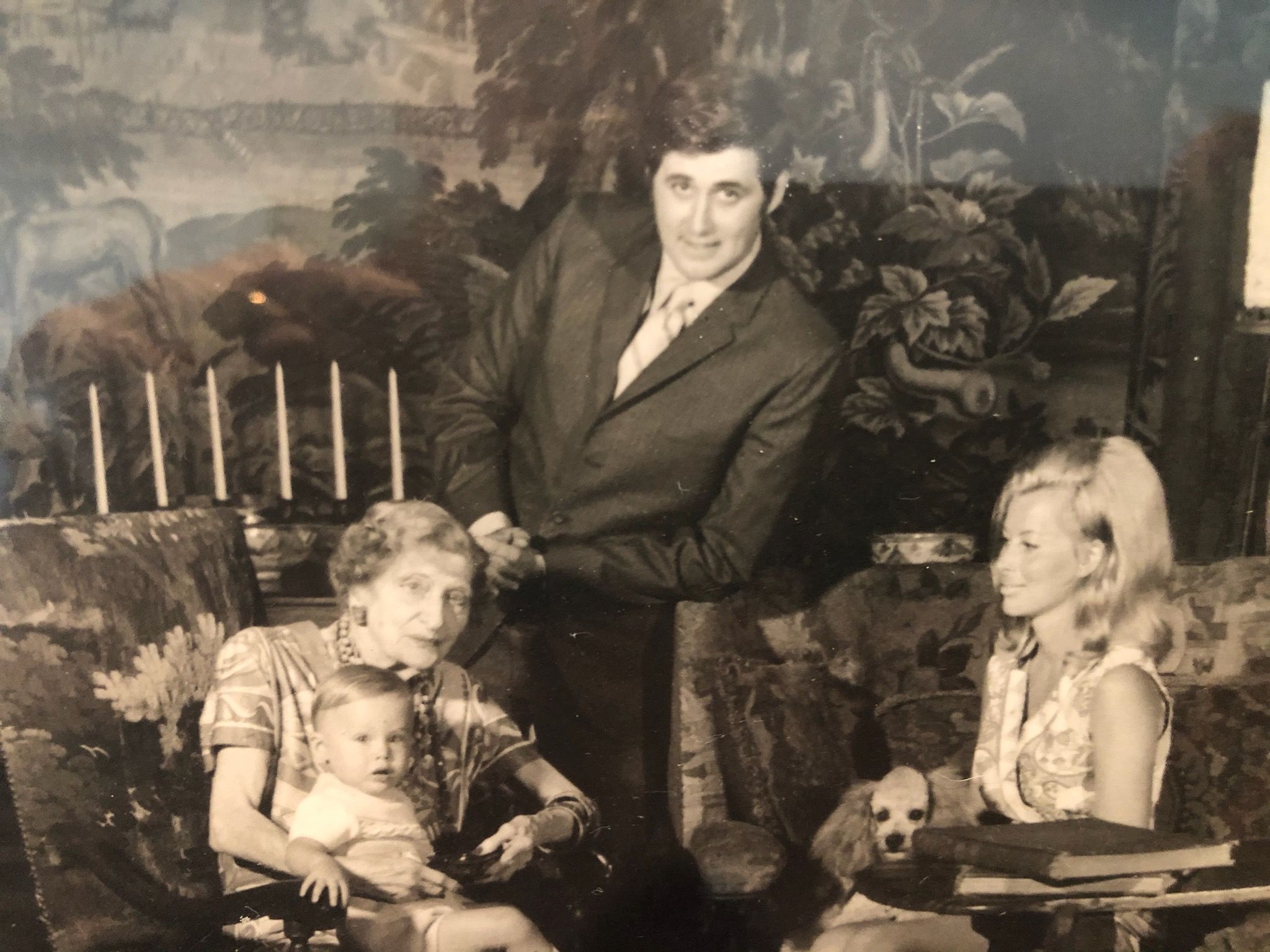Queer Places:
John V. Lindsay East River Park, FDR Dr, New York, NY 10009
 Lillie Lewisohn Vogel (26 November 1876, New
York, New York – 16 June 1976 Washington,
D.C.)[1] was
an art collector, philanthropist,
and socialite from New
York City. She was a lender to the 1913 Armory Show. In a 1972 article, which
estimated Lillie to be over 94 (she was 95), she was said to have forgotten
her age. “Don’t ask me. I can’t remember and I’m sure if I did, I’d be so old,
I’d have to bury me.” [2]
Lillie Lewisohn Vogel (26 November 1876, New
York, New York – 16 June 1976 Washington,
D.C.)[1] was
an art collector, philanthropist,
and socialite from New
York City. She was a lender to the 1913 Armory Show. In a 1972 article, which
estimated Lillie to be over 94 (she was 95), she was said to have forgotten
her age. “Don’t ask me. I can’t remember and I’m sure if I did, I’d be so old,
I’d have to bury me.” [2]
Lillie Lewisohn Vogel was the daughter of Leonard Lewisohn
(1847–1902) and
Rosalie Jacobs Lewisohn
(1849–1900). Her siblings were:
Jesse Lewisohn
(1871–1918),
Julia Lewisohn Henry
(1872–1927),
Samuel Lewisohn
(1875–1898),
Florence Lewisohn Henry
(1878–1903),
Walter Pickett Lewisohn
(1880–1938),
Frederick Lewisohn
(1881–1959), Alice Lewisohn (1883–1972),
Aaron Oscar Lewisohn
(1884–1917), Irene Lewisohn (1892–1944).
Lillie Lewisohn married first her cousin, Albert Lewisohn, and later Martin
Vogel.

Lillie Vogel with Townsend (standing) and her first grandson, Jay, and
Townsend's wife Neva (taken in 1969).
In her life Lillie Lewisohn Vogel waltzed with the Duke of Windsor back in the days when he was the Prince of Wales, met the young Winston Churchill at a Welsh singing festival, motored with David Lloyd George, Britain's World War I Prime Minister (“He was a great flirt, you know”), gotten herself accidentally locked in the tower of the Duke of Rutland's castle, attended “Mrs. Willie K's [that's short for Mrs. William K. Vanderbilt] Christmas Eves,” and in World War II held luncheons and parties that endeared herself to thousands of G.I.'s and top brass pouring through the nation's capital.
In the 1970s grateful former servicemen send her flowers and one of them visited
her to read his verse. “Imagine men at my age,” she said in a tone of
delight.
Even with such a full life, shuttling nonchalantly from New York to London and Paris in earlier years, being on close terms with the Roosevelts, Windsors and Churchills, and being active in countless charities, Lillie
had one regret. “I do so wish I'd gotten to visit Sing Sing,” she sighed. “But I must do something about that.”
Back in the 1890's, most of what she wanted consisted of pretty clothes, beaus and parties. But by the turn of the
XX century the Lewisohn family's tradition of service—which had given New York such things as Lewisohn Stadium, the Neighborhood Playhouse, a nucleus of the Metropolitan Museum's costume wing and the Henry Street Settlement— had surfaced. In the process, Lillie Lewisohn found herself busy with such activities as starting a home for wayward girls and a restaurant in the New York factory district for the newly‐emerging working girl. “I took down a marvelous cook and we had little tables,” she recalled. “I wanted it to be the very best. I wanted it to be as much as possible like the Ritz.”
Except for a sister, Alice Lewisohn, Vogel
was the last of her generation of the New York family. For the last 35 years
of her life she lived in Washington, D.C., most of the time in a rambling red brick home, Norman stone, in Leafy Rock Creek Park. Given to floating chiffons and maribou‐trimmed negligees, Lillie Vogel in appearance
was pure art deco, perhaps permanent Chanel, with pale gold tendrils of hair curling around her cheekbones and at least one looping string of heads, in the same blue as her eyes, hanging around her neck. Her formal entertaining diminished from the old days, but she still received friends amid cherished antiques, books, paintings, fresh flowers and autographed pictures of princes and Presidents and with the aid of her staffers, Diane and Louis (“without whom I could not live.”)
Flowers have always been important to her. In the London of pre‐World War I she and
Gertrude Lawrence, the actress, and Lady
Diana Duff Cooper and Felicity Cory Wright ran a shop called Fresh Flowers for charity. And in the 1920's and 1930's in New York she operated
an antiques shop to subsidize her youth gardens. The gardens was a pet beautification project of hers along the East River “where tenement children might glimpse their first growing plant.” She bought the land and then had dragooned
Sara Delano Roosevelt, mother of President Franklin D. Roosevelt, into doing the planning. She was the moving spirit behind a similar project in Washington that now flourished under the D.C. Recreation Department and the Junior League.
She and Martin Vogel, who was an Assistant Secretary of the Treasury and later helped run the World War I bond campaign, were married in England in 1916 (Arthur Page, then the United States Ambassador, was best man). Vogel recalled how they had to cut short their honeymoon suddenly. They were lunching in the United States Embassy in Berlin as guests of Ambassador James Gerard when war with Germany broke out. “We abandoned lunch,” she said, and she and her husband returned to the United States on the last ship out. The Vogels lived in New York until his death just before World War II. Sometimes
Martin Vogel would travel on J. P. Morgan's yacht, Corsair, to get from his Wall Street office to his country home in Chappaqua, N.Y.
Entertaining was a big part of the Vogels' life and a Lillie Vogel invitation became a bid into a glorious social grab bag. The man sitting to your right might turn out to be an ambassador or the taxi driver who had driven Lillie out from the city. But in 1940, after Mr. Vogel's death, Lillie sought a change of pace, moved to Washington and shortly thereafter established what she called “home hospitality.” It proved to be a rousing success. “Sometimes we gave as many as four parties in one day,” she recalled. For the thousands of World War II service men passing through Washington, it provided entertainment, transportation, a “home away from home” and frequently a memorable luncheon date with their Congressmen.
Lillie Vogel was totally indifferent to age. “An important thing to remember,” she said, “is that after 80 you can do absolutely anything you want to do and people say, ‘How splendid that she can still enjoy life.’ “ She counted as her most joyous occasions the birth of Martin Jr., her only child, after she had deemed herself childless and later the birth of a grandson and the birth of a great‐grand son.
Sometimes friends and members of her family felt compelled to give her advice, but the independence
was always there. “Of course I listen,” she said. “Then I do exactly as I please. I always have. Don't you?”
My published books:


BACK TO HOME PAGE

 Lillie Lewisohn Vogel (26 November 1876, New
York, New York – 16 June 1976 Washington,
D.C.)[1] was
an art collector, philanthropist,
and socialite from New
York City. She was a lender to the 1913 Armory Show. In a 1972 article, which
estimated Lillie to be over 94 (she was 95), she was said to have forgotten
her age. “Don’t ask me. I can’t remember and I’m sure if I did, I’d be so old,
I’d have to bury me.” [2]
Lillie Lewisohn Vogel (26 November 1876, New
York, New York – 16 June 1976 Washington,
D.C.)[1] was
an art collector, philanthropist,
and socialite from New
York City. She was a lender to the 1913 Armory Show. In a 1972 article, which
estimated Lillie to be over 94 (she was 95), she was said to have forgotten
her age. “Don’t ask me. I can’t remember and I’m sure if I did, I’d be so old,
I’d have to bury me.” [2]


